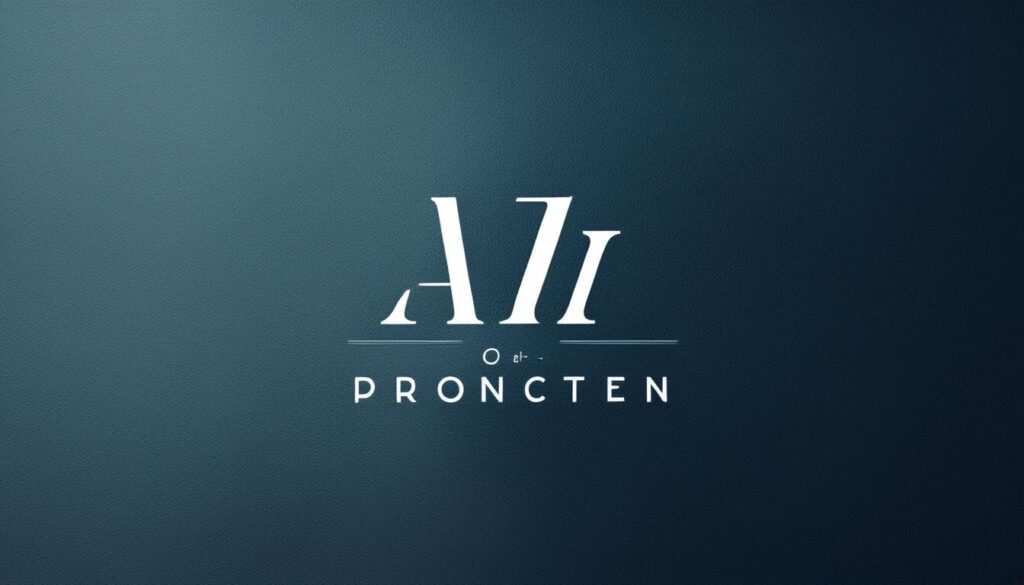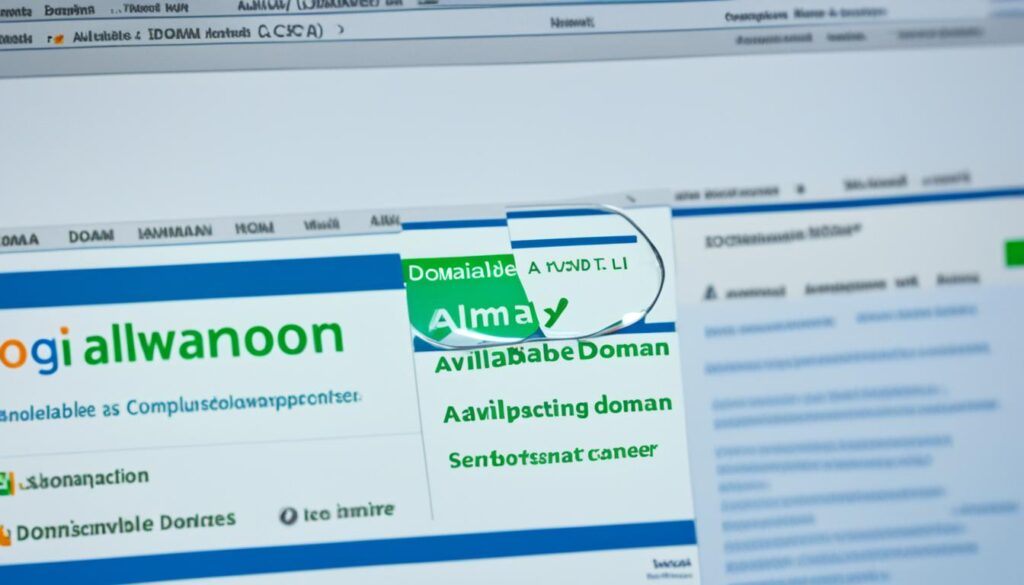Choosing a domain name for your business? Be aware of trademark issues. A domain does not give you trademark rights. Understanding this prevents confusion with cease and desist letters and trademark registration. Trademarks include names, logos, or slogans that identify a business. Domain names are used for finding websites on the internet.
It’s important to handle trademark matters wisely to protect your brand and avoid legal troubles. This guide will help you understand how trademark rights and domain ownership interact. You’ll learn how to research existing trademarks and the value of a trademark attorney. We’ll also talk about choosing a unique name for your brand.

Key Takeaways:
- Trademark rights and domain name ownership are separate entities.
- Thorough research on existing trademarks is essential before choosing a name.
- Hiring a trademark attorney can provide comprehensive legal advice.
- Selecting a strong and unique name helps protect your brand.
- Consider cultural differences and negative connotations in different languages.
The Interplay Between Trademark Rights and Domain Name Ownership
Trademark rights and domain name ownership share common elements but are different. Understanding their relationship is key for anyone using online spaces. This knowledge helps businesses and individuals navigate the web more effectively.
Trademark rights are the legal protections for a name, logo, or slogan related to a business’s products or services. These rights link a company to its offerings in the consumer’s mind. It’s crucial to know that owning a domain does not give you trademark rights. These rights come from using and registering a mark, connecting it to certain goods or services.
Domain name ownership means controlling an internet address. It’s based on who gets there first. But, when choosing a domain, it’s vital to avoid infringing on trademark rights.
Some people register domain names to profit off others’ trademarks, a practice known as cybersquatting. This can lead to legal action and losing the domain. To prevent this, research is essential to ensure the domain doesn’t violate trademark rights.
“The connection between trademark rights and domain ownership stresses the need to consider legal factors online. Being proactive in protecting intellectual property and respecting trademarks is vital for success.”
To understand their relationship better, here’s a table outlining key differences:
| Trademark Rights | Domain Name Ownership |
|---|---|
| Established through use and registration | Obtained by registering a domain name |
| Dependent on the association with specific goods or services | Not dependent on the type of products or services |
| Not absolute; limited by the scope of the products or services | First-come, first-served basis; generally, the first registrant retains ownership |
| Can be infringed upon through cybersquatting | Potential infringement on existing trademark rights |
This relationship between trademark rights and domain ownership shows the need for careful research and following the law. By doing so, businesses and people can build a strong online presence while respecting others’ rights.
Researching Existing Trademarks Before Choosing a Name
Choosing a name for your startup or business is a big step. It’s crucial to check if that name is already taken. If you don’t, you could face legal problems or have to change your brand later. A detailed trademark search is a way to avoid these issues.
You can start by looking at the USPTO database. It lets you find registered trademarks and applications. If the name or logo you want is already in use, you’ll know to pick something else. This step helps make sure your name is unique and legal.
Don’t forget to search online for unregistered trademarks, too. Sometimes, businesses use a name or logo without registering it. Considering both registered and unregistered trademarks is a smart move. It ensures your choice is truly available.

Benefits of Researching Existing Trademarks:
- Prevents trademark infringement: Researching existing trademarks helps you avoid using a name or logo that is similar to an already established brand, minimizing the risk of trademark infringement.
- Prevents legal disputes: By ensuring your proposed name is distinct and legally available, you can steer clear of potential legal conflicts with other trademark owners.
- Avoids rebranding in the future: Thorough research helps you select a name that is unique and not already in use, preventing the need for costly rebranding efforts down the line.
Not doing your homework on trademarks can bring big trouble. You might face lawsuits, fines, and harm to your brand’s reputation. So, take the time to research trademarks well. It’s key to creating a strong brand that’s also legal.
Summary
Before settling on a name for your startup or business, doing a deep trademark search is critical. Use the USPTO database and online searches for this. This way, you ensure your chosen name is not only unique but also legal. It helps dodge trademark issues, legal problems, and the hassle of rebranding later.
| Benefits of Researching Existing Trademarks: |
|---|
| Prevents trademark infringement |
| Prevents legal disputes |
| Avoids rebranding in the future |
The Importance of Hiring a Trademark Attorney
Doing your own research on trademarks is good. But, it’s wise to get a trademark attorney for a full search and legal advice. They know how to do deep searches. They help pick strong, unique names. And, they assist with registration and keeping the trademark safe from others.
Protecting your brand is crucial. That’s where a trademark attorney comes in handy. Let’s talk about why they’re so important:
- Expertise in Trademark Searches: A trademark attorney is skilled in performing trademark searches. They check if your brand or logo steps on another’s toes. They use special tools and databases to spot risks that you might miss.
- Legal Advice: They offer legal advice that fits your brand’s needs. They help you know your rights and rules in trademark laws. This ensures you make smart choices about protecting your brand.
- Registration Assistance: Applying for a trademark is tricky. A trademark attorney walks you through it all. They help prepare and submit all needed paperwork on time.
- Ongoing Monitoring: After registering, it’s key to watch how your trademark is used. A trademark attorney keeps an eye out. They alert you if someone uses your trademark without permission.
Working with a trademark attorney means your brand gets the protection it needs. This minimizes the risk of expensive legal issues. Their knowledge and legal advice are comforting. So, you can focus on growing your business.
Choosing to hire a trademark attorney means investing in your brand’s future success and reputation.

Tips for Selecting a Strong Name
Choosing the right name for your startup is crucial. It should be unique and reflect your brand’s identity and vision. Stay away from common industry terms to avoid trademark issues and build a strong presence.
Creating a unique name can be fun. Consider making up new words or combining existing ones in a creative way. This ensures your name is memorable and stands out to your audience.
Think about what your startup stands for when picking a name. The name should mirror your mission and values. This will help you connect with customers and strengthen your brand.
Getting feedback on the name is really helpful. Ask colleagues, friends, or future customers for their thoughts. Also, checking for existing trademarks is essential. This avoids legal issues and the hassle of renaming later.
A unique name is key in a competitive market. Dedicated time and effort into finding the perfect name will pay off. It helps establish a successful and lasting brand.

Avoiding Generic or Descriptive Words
When naming a startup, a common mistake is choosing generic or descriptive terms. These terms can describe the business well. But they make it hard for customers to tell your brand from others. Also, using these terms might cause trademark infringement issues if the name is taken.
Picking a unique and memorable name helps your business stand out. It reduces the risk of trademark problems. A special name builds a powerful brand identity that customers remember and prefer in the marketplace.
“A generic name blends into the market noise. It makes it hard for customers to link the name to your brand. Choosing a unique name lets your startup leave a lasting impression.”
Avoiding generic words helps startups carve their niche and lead their industry. Thinking creatively and choosing unusual words or phrases is key. A standout name grabs attention and shields your brand’s image and legal standing.
| Benefits of Avoiding Generic or Descriptive Words: |
|---|
| 1. Increased Brand Recognition: A standout name helps customers link your brand to certain products or services. This boosts brand recognition. |
| 2. Reduced Legal Risks: Steering clear of common terms lowers the risk of trademark issues and legal disputes. |
| 3. Differentiation from Competitors: A distinct name makes your business unique and builds a different brand identity. |
| 4. Easier Trademark Registration: Trademarking is simpler for unique names. They’re less likely to be confused with existing trademarks. |

Understanding the importance of a stand-out name can help startups escape the common trap of mundane terms. A well-thought-out name attracts customers and fosters a robust brand for years to come.
International Trademark Issues for Global Expansion
Expanding globally means you must understand international trademark issues well. Laws for trademarks are different in each country. This can affect what is okay in one place but not in another.
Before going global, it’s vital to look into trademarks in your target countries. This research helps you stay away from legal problems. It also lets you figure out how to protect and position your brand abroad.
After choosing where to go, you must register your trademark there. This protects your brand legally and stops others from using it without permission. It keeps your brand’s reputation safe and keeps your market space exclusive.
Navigating Global Trademark Laws with the Help of International Trademark Attorney
Dealing with trademark laws worldwide is tricky. Working with an international trademark attorney is helpful. They provide advice, making sure you follow local laws and regulations. They help with the complex parts of registering your trademark globally, avoiding mistakes and legal issues.
An international trademark attorney takes care of many tasks:
- Looking for trademark issues in each country
- Filling out and sending trademark applications
- Managing the registration process and solving any problems
- Giving advice on trademark management and protection
Getting help from a skilled attorney makes global expansion smoother. This ensures your brand is safe in every new market.
An Overview of Global Trademark Registration Process
The steps to register a trademark globally usually include:
- Filing a trademark application: You have to apply for a trademark in each country you’re entering. The application needs all required info and documents.
- Trademark examination: A trademark office checks each application. They make sure it meets all legal standards and doesn’t clash with existing trademarks.
- Publication and opposition: In some places, they publish the approved application. This allows others to object if they think it infringes on their rights.
- Trademark registration: If there are no objections, or if they’re resolved, the trademark gets registered. The entrepreneur gets a certificate proving they own the trademark there.
It’s important to note that the timeline and requirements vary by country. This is why having an attorney’s guidance is very important.
Case Study: Successful Global Trademark Registration
Let’s look at “InnovateTech,” a tech startup expanding globally.
Before going international, InnovateTech talks to an international trademark attorney. They check if their brand name works in each new market. The attorney does trademark searches in every country.
Based on this work, InnovateTech applies for trademarks in the new markets. The attorney handles the registration and any issues that come up.
Thanks to their careful planning, InnovateTech gets exclusive rights to their name in these countries. They have a strong legal base for expansion and protect their brand from misuse.
Key Considerations for Global Trademark Registration
| Consideration | Description |
|---|---|
| Research | Do deep research on existing trademarks in target countries to avoid issues and disputes. |
| Registration | Apply for trademarks in each country for legal protection and ownership. |
| Collaboration | Partner with an international trademark attorney for help with global trademark laws. |
| Monitoring | Keep an eye on your trademark for any unauthorized use or infringement. |
Making the Name Unique
When you start a new business, picking a unique name is key. This avoids mix-ups with famous brands in all fields. A unique brand identity makes your startup stand out and builds a strong market presence.
Naming your startup too close to big brands can cause legal problems. It can also hurt your brand’s image.
Doing your homework on trademarks is crucial. This ensures your chosen name is legal and one of a kind. Talking to a trademark attorney offers helpful advice. They help you understand trademark laws and prevent legal issues.

With careful research and expert advice, you protect your brand’s uniqueness. Registering your trademark offers extra security. It gives you sole rights to your brand identity and stops others from using similar names or logos. This shield works across various industries, keeping your identity unique as your business grows.
Social Media and Domain Name Availability
When picking a name for your startup, check its availability on social media and as a domain name. This ensures the name is not used by others and avoids future legal trouble.
Look on social media to see if another business or person is using the name. Having a unique online identity is crucial. Check platforms like Facebook, Instagram, and Twitter to see if the name is free.
It’s also critical to check if the domain name is available. Your domain name is like your online address. It shows who you are on the internet. Make sure another entity hasn’t registered your chosen name.
Use domain registration sites to look for name availability. Sites like GoDaddy and Namecheap are helpful. They let you see if you can buy your desired domain name. If not, they suggest other names or extensions.
Consistent names on social media and a matching domain are vital for a strong online business presence.

EXAMPLE: Brand Name Availability on Social Media and Domain Registration
John is creating “Glam Boutique,” an online fashion store. He wants a unique name to stand out.
| Social Media Platform | Username Availability |
|---|---|
| Taken (GlamBoutiqueOfficial) | |
| Available | |
| Taken (Glam_Boutique) |
The name “Glam Boutique” is taken on Facebook, but free on Instagram. On Twitter, he needs a different username because “Glam_Boutique” is used.
John then checks if the domain name is available.
| Domain Registration Platform | Domain Availability |
|---|---|
| GoDaddy | Available (glamboutique.com) |
| Namecheap | Available (glam-boutique.net) |
Luckily, his desired domain name is free on GoDaddy and Namecheap. He can pick “glamboutique.com” or “glam-boutique.net” for his website.
This research helps John keep a unique brand across social media. It also secures a domain that matches his business name. This way, he creates a strong online presence without clashing with other brands.
Considering Cultural Differences in Naming
When picking a name for your brand, it’s key to think about cultural differences. Words or phrases might have bad meanings in other languages. To avoid names that could offend and to build a strong image globally, doing your homework is vital. You should work with a marketing pro who knows the global scene well.
Different cultures can see words in various ways. What sounds good in one language could be offensive in another. This might hurt the brand’s image and block its success across the globe.
It’s important to check if words have bad meanings in other languages. Knowing the cultural background of words helps you avoid picking a name that upsets your audience.
For example:
In the U.S., white means purity. But in some Asian cultures, it’s linked to death. A brand using white a lot might confuse or upset customers in these places.
Consulting with a marketing consultant experienced in international markets
Getting advice from a marketing expert with global know-how is smart when going global. They can guide you on what works in different cultures. This helps you move smoothly into international markets.
A marketing expert can help you:
- Understand what people like and how they behave in various countries.
- Spot problems and cultural issues that could affect your brand.
- Make a marketing plan that speaks to each market’s unique tastes.
For example:
A drink brand moving into the Middle East might need expert advice. An expert on the area can help with branding. They make sure the product’s name, look, and ads fit local traditions.
Thinking about cultural differences helps your brand name go beyond borders. Choosing a name wisely and with respect for culture can make your brand strong globally. This careful approach can lead to growth worldwide.

Trademark Registration for Brand Protection
Once you choose a name for your startup, protecting your brand is crucial. Trademark registration is key for this protection. It gives you legal rights and sole ownership of your name and logo.
A registered trademark brings many benefits. It lets you alone use your brand for your goods or services. This stops rivals from using similar names or logos that could confuse customers.
To start the trademark registration, submit an application at the USPTO website. The application needs correct documents and must follow certain rules.
An experienced trademark attorney can make the process easier. They can help with the documents and guide you through registration.
With a registered trademark, your brand is well-protected. It warns off potential misusers and lets you take legal action if needed. Keeping an eye on your logo’s use is key to protect your identity.
So, remember to register your trademark to protect your startup. It stops others from using your name or logo without permission.
Importance of Monitoring and Enforcing Trademark Rights
Getting a trademark is just the start. **Trademark enforcement** is key to keeping your brand safe. You need to watch how your logo is used everywhere to spot misuse.
Checking social media, websites, and online stores lets you act fast against misuse. This might mean talking to the offender or sending a **cease and desist letter** to defend your rights.
When misuse continues, or it really hurts your brand, going to court may be needed. Getting compensation and court orders can keep your trademark safe and your brand secure.